NURS11162: Caring for Marginalised Groups in Society - CQUniversity
VerifiedAdded on 2023/06/04
|11
|2793
|282
Essay
AI Summary
This essay discusses the care provided to homeless people in healthcare institutions, focusing on the effects of stigmatization, nursing strategies for improved hospital experiences, challenges of health literacy, and the concept of moral judgment. It highlights the importance of patient-centered care, changing attitudes towards the homeless, and promoting health literacy through education and clear communication. The essay also addresses the ethical considerations in providing care to marginalized groups, emphasizing the need for healthcare professionals to balance emotions and reason while adhering to medical ethics. Ultimately, the essay underscores the significance of overcoming stigmatization and ensuring quality care for all patients, regardless of their social status.
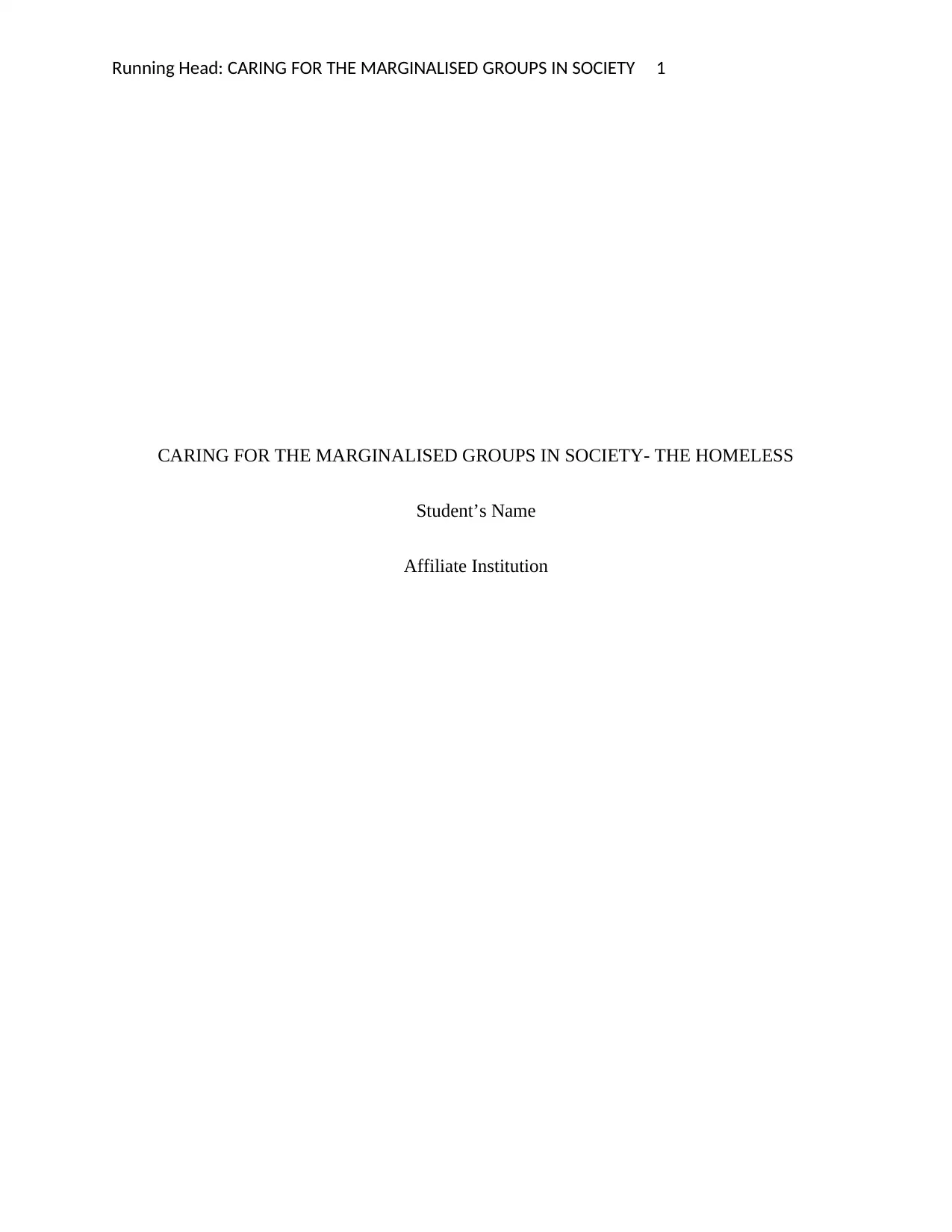
Running Head: CARING FOR THE MARGINALISED GROUPS IN SOCIETY 1
CARING FOR THE MARGINALISED GROUPS IN SOCIETY- THE HOMELESS
Student’s Name
Affiliate Institution
CARING FOR THE MARGINALISED GROUPS IN SOCIETY- THE HOMELESS
Student’s Name
Affiliate Institution
Paraphrase This Document
Need a fresh take? Get an instant paraphrase of this document with our AI Paraphraser
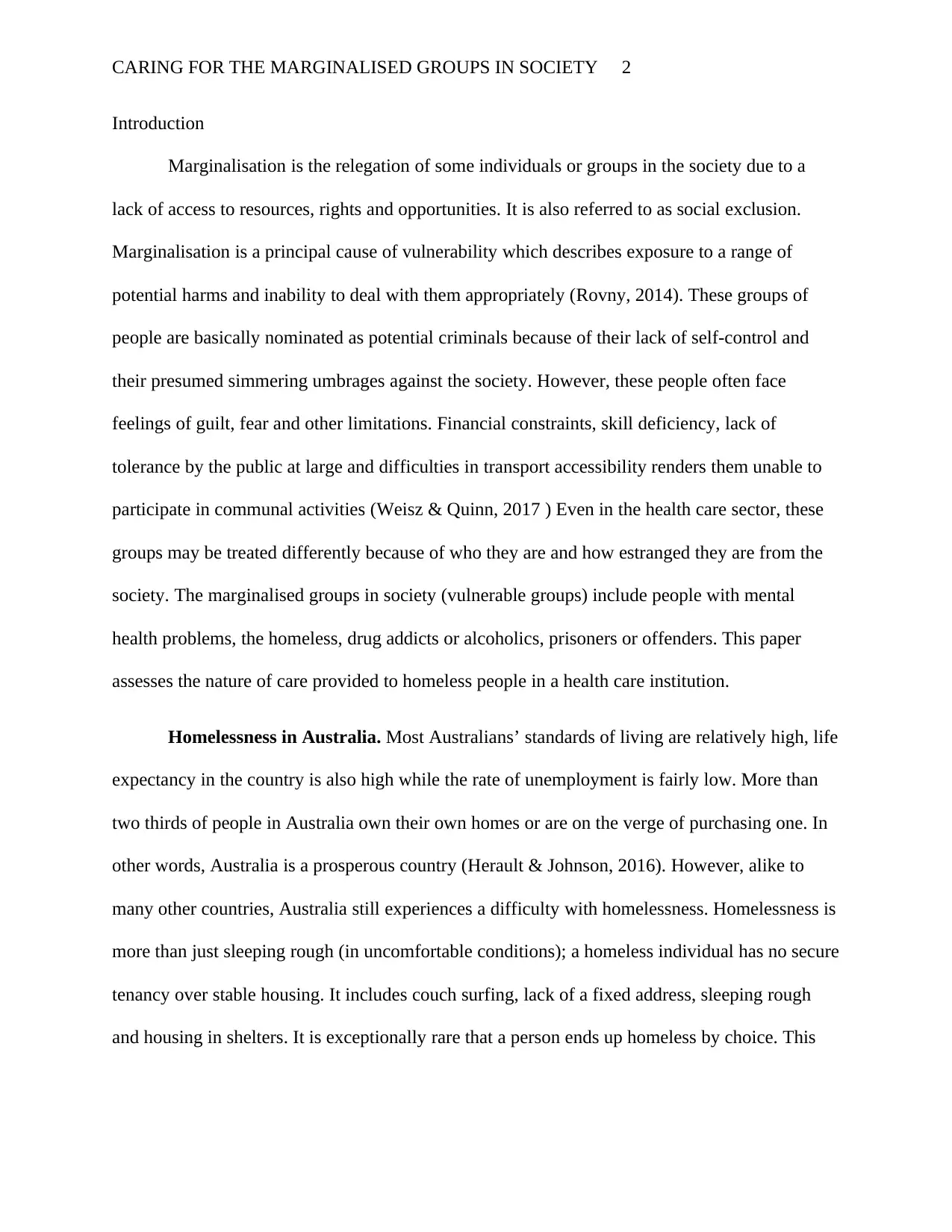
CARING FOR THE MARGINALISED GROUPS IN SOCIETY 2
Introduction
Marginalisation is the relegation of some individuals or groups in the society due to a
lack of access to resources, rights and opportunities. It is also referred to as social exclusion.
Marginalisation is a principal cause of vulnerability which describes exposure to a range of
potential harms and inability to deal with them appropriately (Rovny, 2014). These groups of
people are basically nominated as potential criminals because of their lack of self-control and
their presumed simmering umbrages against the society. However, these people often face
feelings of guilt, fear and other limitations. Financial constraints, skill deficiency, lack of
tolerance by the public at large and difficulties in transport accessibility renders them unable to
participate in communal activities (Weisz & Quinn, 2017 ) Even in the health care sector, these
groups may be treated differently because of who they are and how estranged they are from the
society. The marginalised groups in society (vulnerable groups) include people with mental
health problems, the homeless, drug addicts or alcoholics, prisoners or offenders. This paper
assesses the nature of care provided to homeless people in a health care institution.
Homelessness in Australia. Most Australians’ standards of living are relatively high, life
expectancy in the country is also high while the rate of unemployment is fairly low. More than
two thirds of people in Australia own their own homes or are on the verge of purchasing one. In
other words, Australia is a prosperous country (Herault & Johnson, 2016). However, alike to
many other countries, Australia still experiences a difficulty with homelessness. Homelessness is
more than just sleeping rough (in uncomfortable conditions); a homeless individual has no secure
tenancy over stable housing. It includes couch surfing, lack of a fixed address, sleeping rough
and housing in shelters. It is exceptionally rare that a person ends up homeless by choice. This
Introduction
Marginalisation is the relegation of some individuals or groups in the society due to a
lack of access to resources, rights and opportunities. It is also referred to as social exclusion.
Marginalisation is a principal cause of vulnerability which describes exposure to a range of
potential harms and inability to deal with them appropriately (Rovny, 2014). These groups of
people are basically nominated as potential criminals because of their lack of self-control and
their presumed simmering umbrages against the society. However, these people often face
feelings of guilt, fear and other limitations. Financial constraints, skill deficiency, lack of
tolerance by the public at large and difficulties in transport accessibility renders them unable to
participate in communal activities (Weisz & Quinn, 2017 ) Even in the health care sector, these
groups may be treated differently because of who they are and how estranged they are from the
society. The marginalised groups in society (vulnerable groups) include people with mental
health problems, the homeless, drug addicts or alcoholics, prisoners or offenders. This paper
assesses the nature of care provided to homeless people in a health care institution.
Homelessness in Australia. Most Australians’ standards of living are relatively high, life
expectancy in the country is also high while the rate of unemployment is fairly low. More than
two thirds of people in Australia own their own homes or are on the verge of purchasing one. In
other words, Australia is a prosperous country (Herault & Johnson, 2016). However, alike to
many other countries, Australia still experiences a difficulty with homelessness. Homelessness is
more than just sleeping rough (in uncomfortable conditions); a homeless individual has no secure
tenancy over stable housing. It includes couch surfing, lack of a fixed address, sleeping rough
and housing in shelters. It is exceptionally rare that a person ends up homeless by choice. This
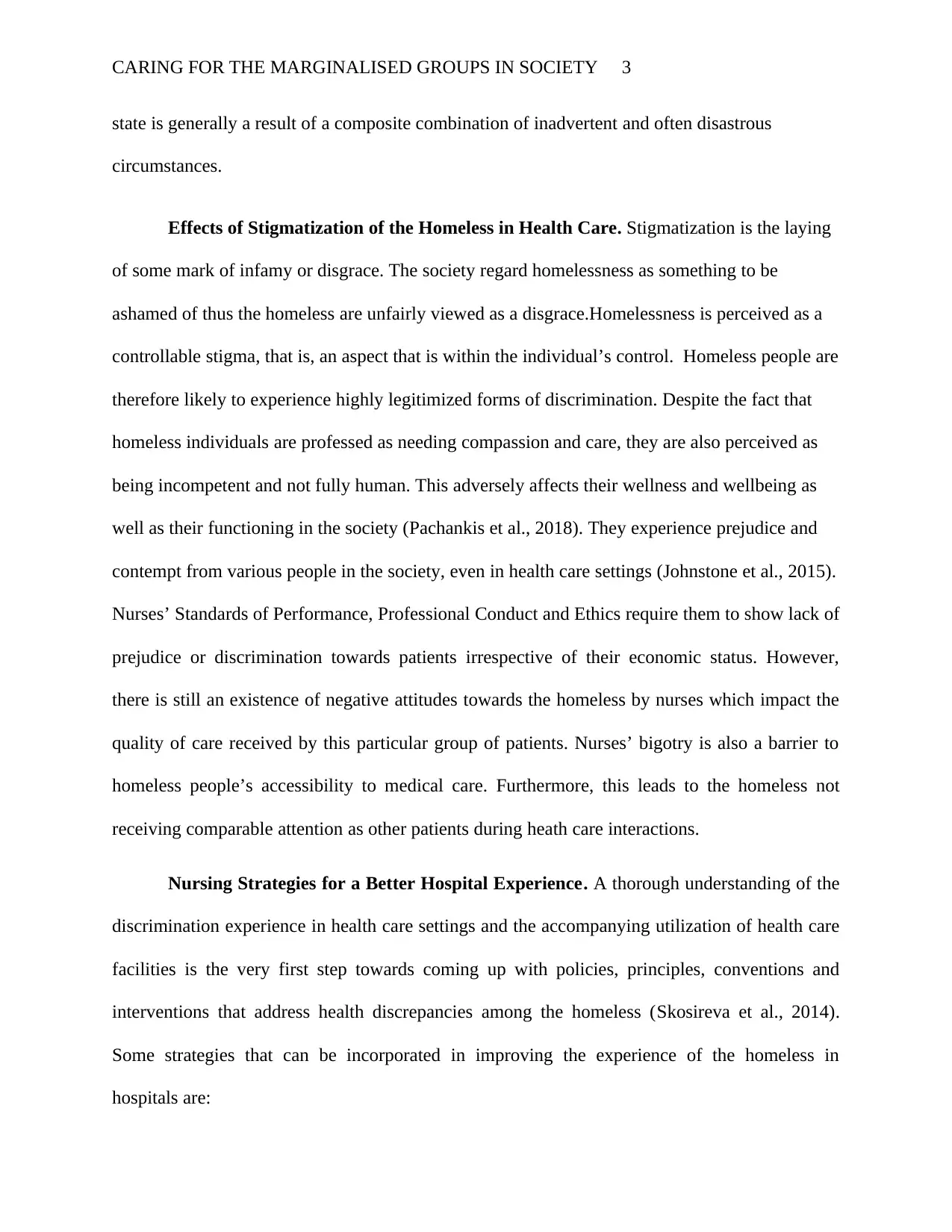
CARING FOR THE MARGINALISED GROUPS IN SOCIETY 3
state is generally a result of a composite combination of inadvertent and often disastrous
circumstances.
Effects of Stigmatization of the Homeless in Health Care. Stigmatization is the laying
of some mark of infamy or disgrace. The society regard homelessness as something to be
ashamed of thus the homeless are unfairly viewed as a disgrace.Homelessness is perceived as a
controllable stigma, that is, an aspect that is within the individual’s control. Homeless people are
therefore likely to experience highly legitimized forms of discrimination. Despite the fact that
homeless individuals are professed as needing compassion and care, they are also perceived as
being incompetent and not fully human. This adversely affects their wellness and wellbeing as
well as their functioning in the society (Pachankis et al., 2018). They experience prejudice and
contempt from various people in the society, even in health care settings (Johnstone et al., 2015).
Nurses’ Standards of Performance, Professional Conduct and Ethics require them to show lack of
prejudice or discrimination towards patients irrespective of their economic status. However,
there is still an existence of negative attitudes towards the homeless by nurses which impact the
quality of care received by this particular group of patients. Nurses’ bigotry is also a barrier to
homeless people’s accessibility to medical care. Furthermore, this leads to the homeless not
receiving comparable attention as other patients during heath care interactions.
Nursing Strategies for a Better Hospital Experience. A thorough understanding of the
discrimination experience in health care settings and the accompanying utilization of health care
facilities is the very first step towards coming up with policies, principles, conventions and
interventions that address health discrepancies among the homeless (Skosireva et al., 2014).
Some strategies that can be incorporated in improving the experience of the homeless in
hospitals are:
state is generally a result of a composite combination of inadvertent and often disastrous
circumstances.
Effects of Stigmatization of the Homeless in Health Care. Stigmatization is the laying
of some mark of infamy or disgrace. The society regard homelessness as something to be
ashamed of thus the homeless are unfairly viewed as a disgrace.Homelessness is perceived as a
controllable stigma, that is, an aspect that is within the individual’s control. Homeless people are
therefore likely to experience highly legitimized forms of discrimination. Despite the fact that
homeless individuals are professed as needing compassion and care, they are also perceived as
being incompetent and not fully human. This adversely affects their wellness and wellbeing as
well as their functioning in the society (Pachankis et al., 2018). They experience prejudice and
contempt from various people in the society, even in health care settings (Johnstone et al., 2015).
Nurses’ Standards of Performance, Professional Conduct and Ethics require them to show lack of
prejudice or discrimination towards patients irrespective of their economic status. However,
there is still an existence of negative attitudes towards the homeless by nurses which impact the
quality of care received by this particular group of patients. Nurses’ bigotry is also a barrier to
homeless people’s accessibility to medical care. Furthermore, this leads to the homeless not
receiving comparable attention as other patients during heath care interactions.
Nursing Strategies for a Better Hospital Experience. A thorough understanding of the
discrimination experience in health care settings and the accompanying utilization of health care
facilities is the very first step towards coming up with policies, principles, conventions and
interventions that address health discrepancies among the homeless (Skosireva et al., 2014).
Some strategies that can be incorporated in improving the experience of the homeless in
hospitals are:
⊘ This is a preview!⊘
Do you want full access?
Subscribe today to unlock all pages.

Trusted by 1+ million students worldwide
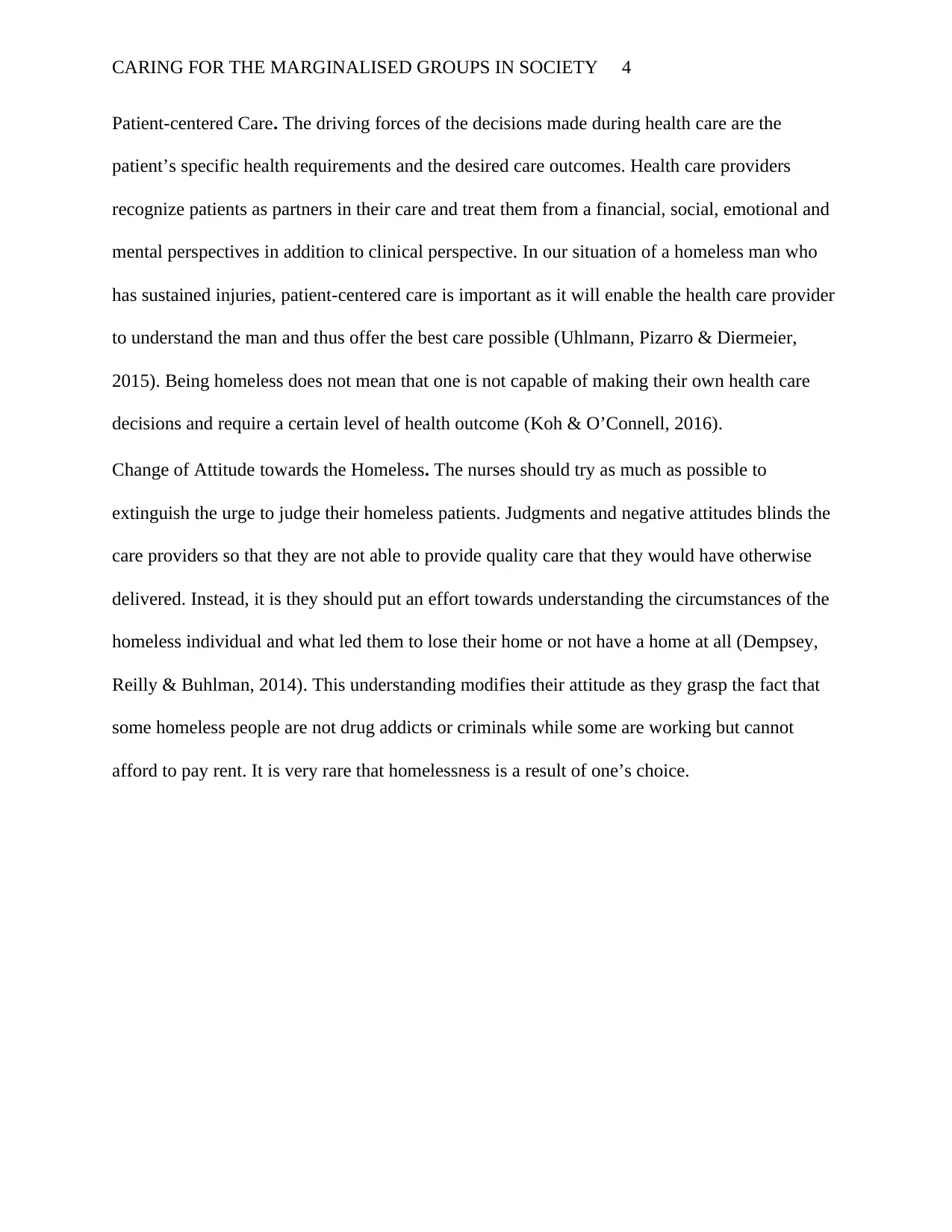
CARING FOR THE MARGINALISED GROUPS IN SOCIETY 4
Patient-centered Care. The driving forces of the decisions made during health care are the
patient’s specific health requirements and the desired care outcomes. Health care providers
recognize patients as partners in their care and treat them from a financial, social, emotional and
mental perspectives in addition to clinical perspective. In our situation of a homeless man who
has sustained injuries, patient-centered care is important as it will enable the health care provider
to understand the man and thus offer the best care possible (Uhlmann, Pizarro & Diermeier,
2015). Being homeless does not mean that one is not capable of making their own health care
decisions and require a certain level of health outcome (Koh & O’Connell, 2016).
Change of Attitude towards the Homeless. The nurses should try as much as possible to
extinguish the urge to judge their homeless patients. Judgments and negative attitudes blinds the
care providers so that they are not able to provide quality care that they would have otherwise
delivered. Instead, it is they should put an effort towards understanding the circumstances of the
homeless individual and what led them to lose their home or not have a home at all (Dempsey,
Reilly & Buhlman, 2014). This understanding modifies their attitude as they grasp the fact that
some homeless people are not drug addicts or criminals while some are working but cannot
afford to pay rent. It is very rare that homelessness is a result of one’s choice.
Patient-centered Care. The driving forces of the decisions made during health care are the
patient’s specific health requirements and the desired care outcomes. Health care providers
recognize patients as partners in their care and treat them from a financial, social, emotional and
mental perspectives in addition to clinical perspective. In our situation of a homeless man who
has sustained injuries, patient-centered care is important as it will enable the health care provider
to understand the man and thus offer the best care possible (Uhlmann, Pizarro & Diermeier,
2015). Being homeless does not mean that one is not capable of making their own health care
decisions and require a certain level of health outcome (Koh & O’Connell, 2016).
Change of Attitude towards the Homeless. The nurses should try as much as possible to
extinguish the urge to judge their homeless patients. Judgments and negative attitudes blinds the
care providers so that they are not able to provide quality care that they would have otherwise
delivered. Instead, it is they should put an effort towards understanding the circumstances of the
homeless individual and what led them to lose their home or not have a home at all (Dempsey,
Reilly & Buhlman, 2014). This understanding modifies their attitude as they grasp the fact that
some homeless people are not drug addicts or criminals while some are working but cannot
afford to pay rent. It is very rare that homelessness is a result of one’s choice.
Paraphrase This Document
Need a fresh take? Get an instant paraphrase of this document with our AI Paraphraser
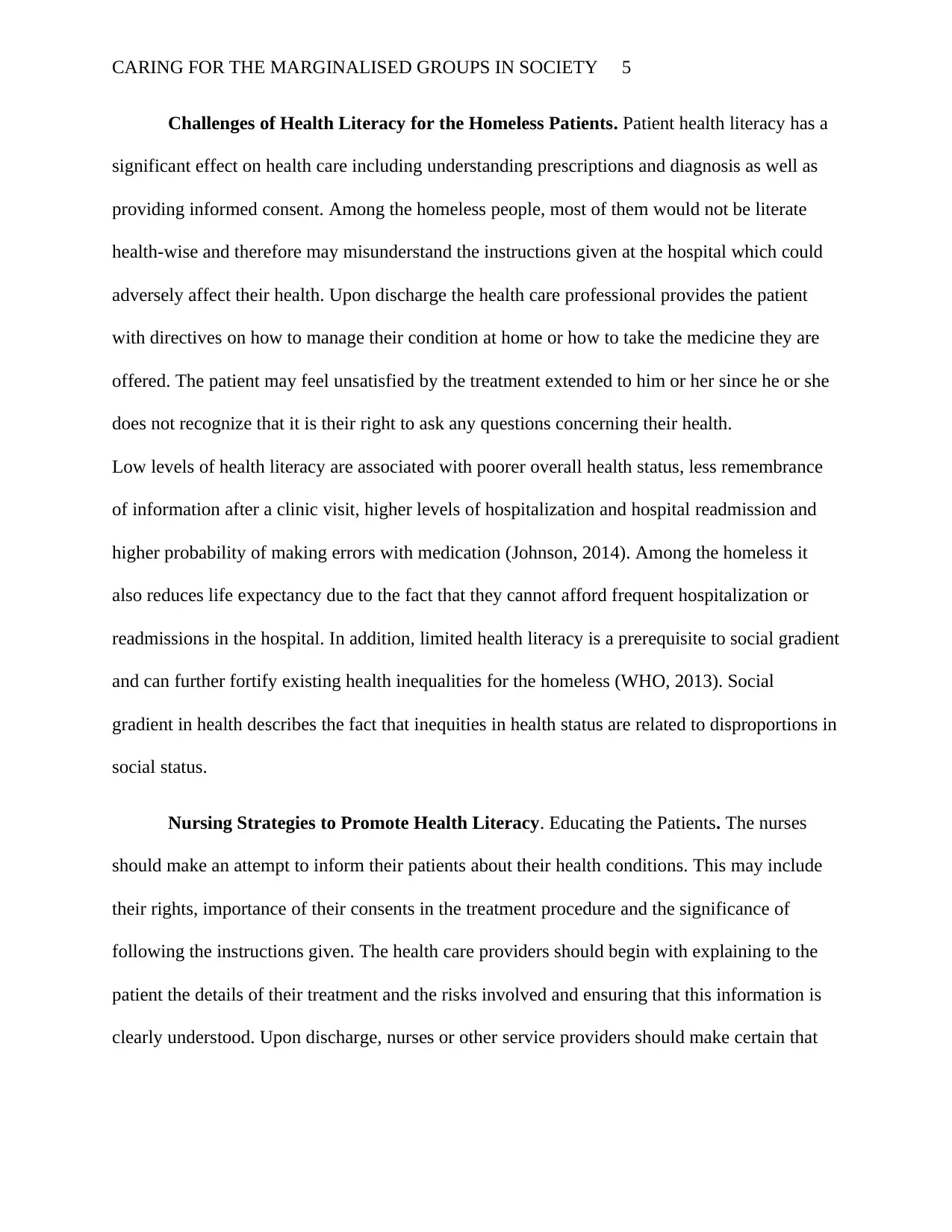
CARING FOR THE MARGINALISED GROUPS IN SOCIETY 5
Challenges of Health Literacy for the Homeless Patients. Patient health literacy has a
significant effect on health care including understanding prescriptions and diagnosis as well as
providing informed consent. Among the homeless people, most of them would not be literate
health-wise and therefore may misunderstand the instructions given at the hospital which could
adversely affect their health. Upon discharge the health care professional provides the patient
with directives on how to manage their condition at home or how to take the medicine they are
offered. The patient may feel unsatisfied by the treatment extended to him or her since he or she
does not recognize that it is their right to ask any questions concerning their health.
Low levels of health literacy are associated with poorer overall health status, less remembrance
of information after a clinic visit, higher levels of hospitalization and hospital readmission and
higher probability of making errors with medication (Johnson, 2014). Among the homeless it
also reduces life expectancy due to the fact that they cannot afford frequent hospitalization or
readmissions in the hospital. In addition, limited health literacy is a prerequisite to social gradient
and can further fortify existing health inequalities for the homeless (WHO, 2013). Social
gradient in health describes the fact that inequities in health status are related to disproportions in
social status.
Nursing Strategies to Promote Health Literacy. Educating the Patients. The nurses
should make an attempt to inform their patients about their health conditions. This may include
their rights, importance of their consents in the treatment procedure and the significance of
following the instructions given. The health care providers should begin with explaining to the
patient the details of their treatment and the risks involved and ensuring that this information is
clearly understood. Upon discharge, nurses or other service providers should make certain that
Challenges of Health Literacy for the Homeless Patients. Patient health literacy has a
significant effect on health care including understanding prescriptions and diagnosis as well as
providing informed consent. Among the homeless people, most of them would not be literate
health-wise and therefore may misunderstand the instructions given at the hospital which could
adversely affect their health. Upon discharge the health care professional provides the patient
with directives on how to manage their condition at home or how to take the medicine they are
offered. The patient may feel unsatisfied by the treatment extended to him or her since he or she
does not recognize that it is their right to ask any questions concerning their health.
Low levels of health literacy are associated with poorer overall health status, less remembrance
of information after a clinic visit, higher levels of hospitalization and hospital readmission and
higher probability of making errors with medication (Johnson, 2014). Among the homeless it
also reduces life expectancy due to the fact that they cannot afford frequent hospitalization or
readmissions in the hospital. In addition, limited health literacy is a prerequisite to social gradient
and can further fortify existing health inequalities for the homeless (WHO, 2013). Social
gradient in health describes the fact that inequities in health status are related to disproportions in
social status.
Nursing Strategies to Promote Health Literacy. Educating the Patients. The nurses
should make an attempt to inform their patients about their health conditions. This may include
their rights, importance of their consents in the treatment procedure and the significance of
following the instructions given. The health care providers should begin with explaining to the
patient the details of their treatment and the risks involved and ensuring that this information is
clearly understood. Upon discharge, nurses or other service providers should make certain that
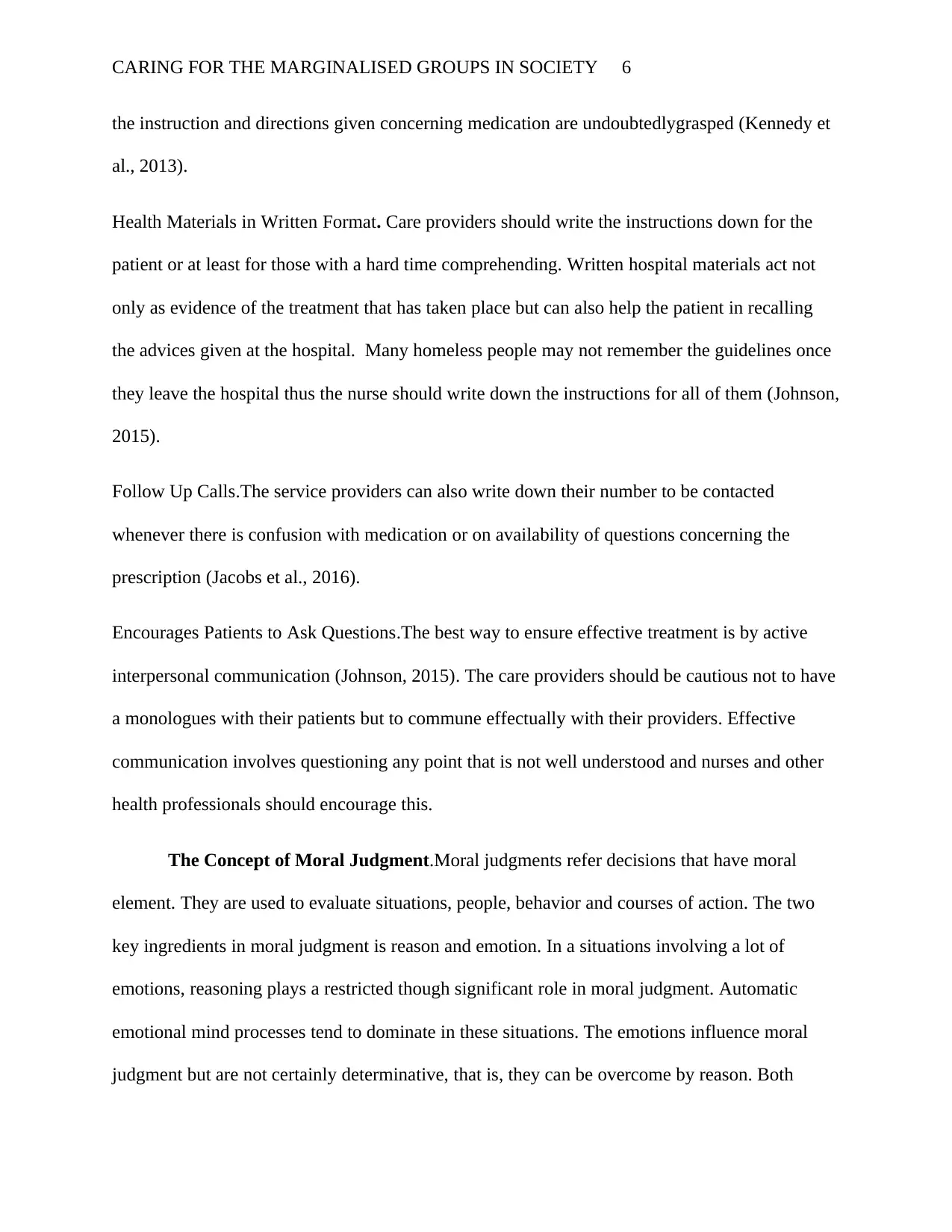
CARING FOR THE MARGINALISED GROUPS IN SOCIETY 6
the instruction and directions given concerning medication are undoubtedlygrasped (Kennedy et
al., 2013).
Health Materials in Written Format. Care providers should write the instructions down for the
patient or at least for those with a hard time comprehending. Written hospital materials act not
only as evidence of the treatment that has taken place but can also help the patient in recalling
the advices given at the hospital. Many homeless people may not remember the guidelines once
they leave the hospital thus the nurse should write down the instructions for all of them (Johnson,
2015).
Follow Up Calls.The service providers can also write down their number to be contacted
whenever there is confusion with medication or on availability of questions concerning the
prescription (Jacobs et al., 2016).
Encourages Patients to Ask Questions.The best way to ensure effective treatment is by active
interpersonal communication (Johnson, 2015). The care providers should be cautious not to have
a monologues with their patients but to commune effectually with their providers. Effective
communication involves questioning any point that is not well understood and nurses and other
health professionals should encourage this.
The Concept of Moral Judgment.Moral judgments refer decisions that have moral
element. They are used to evaluate situations, people, behavior and courses of action. The two
key ingredients in moral judgment is reason and emotion. In a situations involving a lot of
emotions, reasoning plays a restricted though significant role in moral judgment. Automatic
emotional mind processes tend to dominate in these situations. The emotions influence moral
judgment but are not certainly determinative, that is, they can be overcome by reason. Both
the instruction and directions given concerning medication are undoubtedlygrasped (Kennedy et
al., 2013).
Health Materials in Written Format. Care providers should write the instructions down for the
patient or at least for those with a hard time comprehending. Written hospital materials act not
only as evidence of the treatment that has taken place but can also help the patient in recalling
the advices given at the hospital. Many homeless people may not remember the guidelines once
they leave the hospital thus the nurse should write down the instructions for all of them (Johnson,
2015).
Follow Up Calls.The service providers can also write down their number to be contacted
whenever there is confusion with medication or on availability of questions concerning the
prescription (Jacobs et al., 2016).
Encourages Patients to Ask Questions.The best way to ensure effective treatment is by active
interpersonal communication (Johnson, 2015). The care providers should be cautious not to have
a monologues with their patients but to commune effectually with their providers. Effective
communication involves questioning any point that is not well understood and nurses and other
health professionals should encourage this.
The Concept of Moral Judgment.Moral judgments refer decisions that have moral
element. They are used to evaluate situations, people, behavior and courses of action. The two
key ingredients in moral judgment is reason and emotion. In a situations involving a lot of
emotions, reasoning plays a restricted though significant role in moral judgment. Automatic
emotional mind processes tend to dominate in these situations. The emotions influence moral
judgment but are not certainly determinative, that is, they can be overcome by reason. Both
⊘ This is a preview!⊘
Do you want full access?
Subscribe today to unlock all pages.

Trusted by 1+ million students worldwide
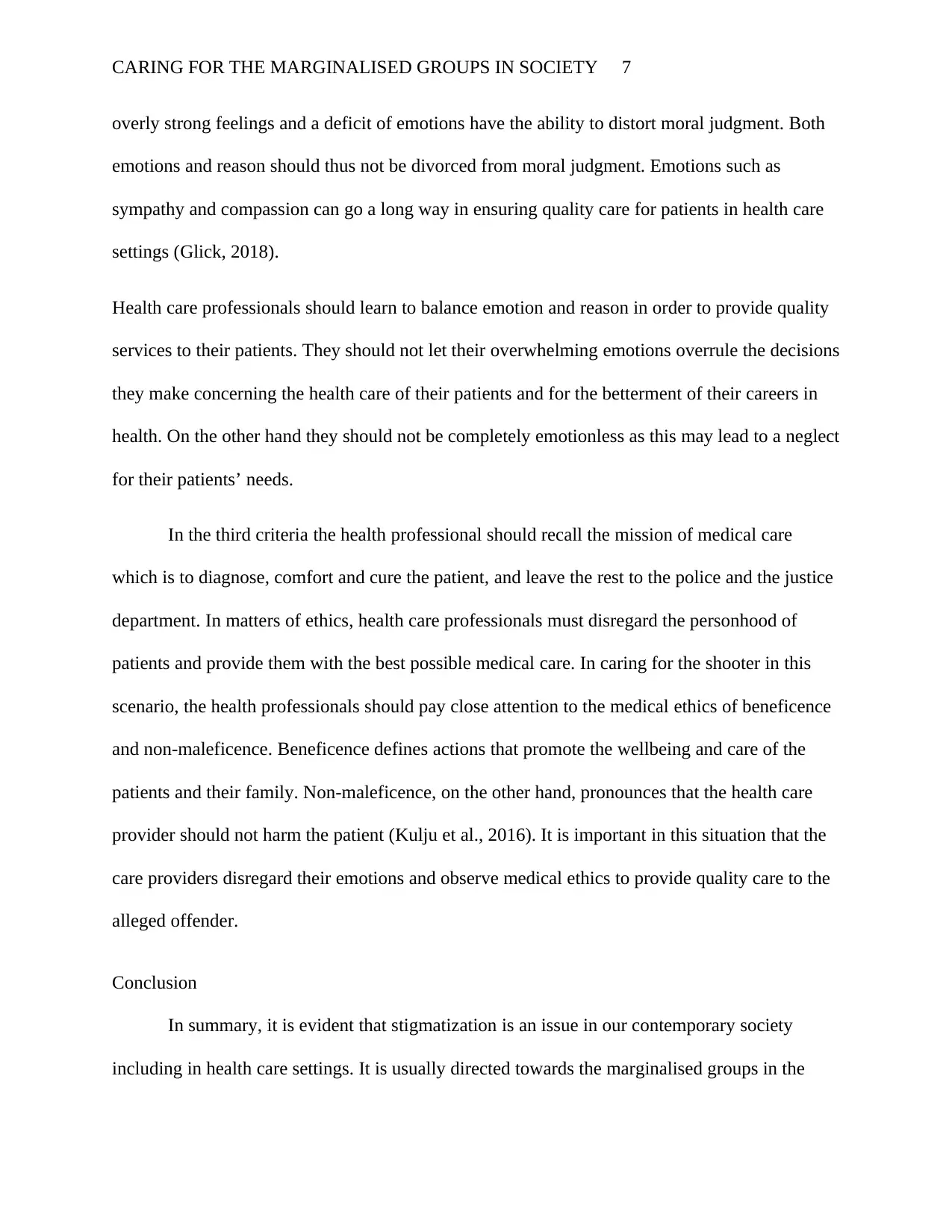
CARING FOR THE MARGINALISED GROUPS IN SOCIETY 7
overly strong feelings and a deficit of emotions have the ability to distort moral judgment. Both
emotions and reason should thus not be divorced from moral judgment. Emotions such as
sympathy and compassion can go a long way in ensuring quality care for patients in health care
settings (Glick, 2018).
Health care professionals should learn to balance emotion and reason in order to provide quality
services to their patients. They should not let their overwhelming emotions overrule the decisions
they make concerning the health care of their patients and for the betterment of their careers in
health. On the other hand they should not be completely emotionless as this may lead to a neglect
for their patients’ needs.
In the third criteria the health professional should recall the mission of medical care
which is to diagnose, comfort and cure the patient, and leave the rest to the police and the justice
department. In matters of ethics, health care professionals must disregard the personhood of
patients and provide them with the best possible medical care. In caring for the shooter in this
scenario, the health professionals should pay close attention to the medical ethics of beneficence
and non-maleficence. Beneficence defines actions that promote the wellbeing and care of the
patients and their family. Non-maleficence, on the other hand, pronounces that the health care
provider should not harm the patient (Kulju et al., 2016). It is important in this situation that the
care providers disregard their emotions and observe medical ethics to provide quality care to the
alleged offender.
Conclusion
In summary, it is evident that stigmatization is an issue in our contemporary society
including in health care settings. It is usually directed towards the marginalised groups in the
overly strong feelings and a deficit of emotions have the ability to distort moral judgment. Both
emotions and reason should thus not be divorced from moral judgment. Emotions such as
sympathy and compassion can go a long way in ensuring quality care for patients in health care
settings (Glick, 2018).
Health care professionals should learn to balance emotion and reason in order to provide quality
services to their patients. They should not let their overwhelming emotions overrule the decisions
they make concerning the health care of their patients and for the betterment of their careers in
health. On the other hand they should not be completely emotionless as this may lead to a neglect
for their patients’ needs.
In the third criteria the health professional should recall the mission of medical care
which is to diagnose, comfort and cure the patient, and leave the rest to the police and the justice
department. In matters of ethics, health care professionals must disregard the personhood of
patients and provide them with the best possible medical care. In caring for the shooter in this
scenario, the health professionals should pay close attention to the medical ethics of beneficence
and non-maleficence. Beneficence defines actions that promote the wellbeing and care of the
patients and their family. Non-maleficence, on the other hand, pronounces that the health care
provider should not harm the patient (Kulju et al., 2016). It is important in this situation that the
care providers disregard their emotions and observe medical ethics to provide quality care to the
alleged offender.
Conclusion
In summary, it is evident that stigmatization is an issue in our contemporary society
including in health care settings. It is usually directed towards the marginalised groups in the
Paraphrase This Document
Need a fresh take? Get an instant paraphrase of this document with our AI Paraphraser
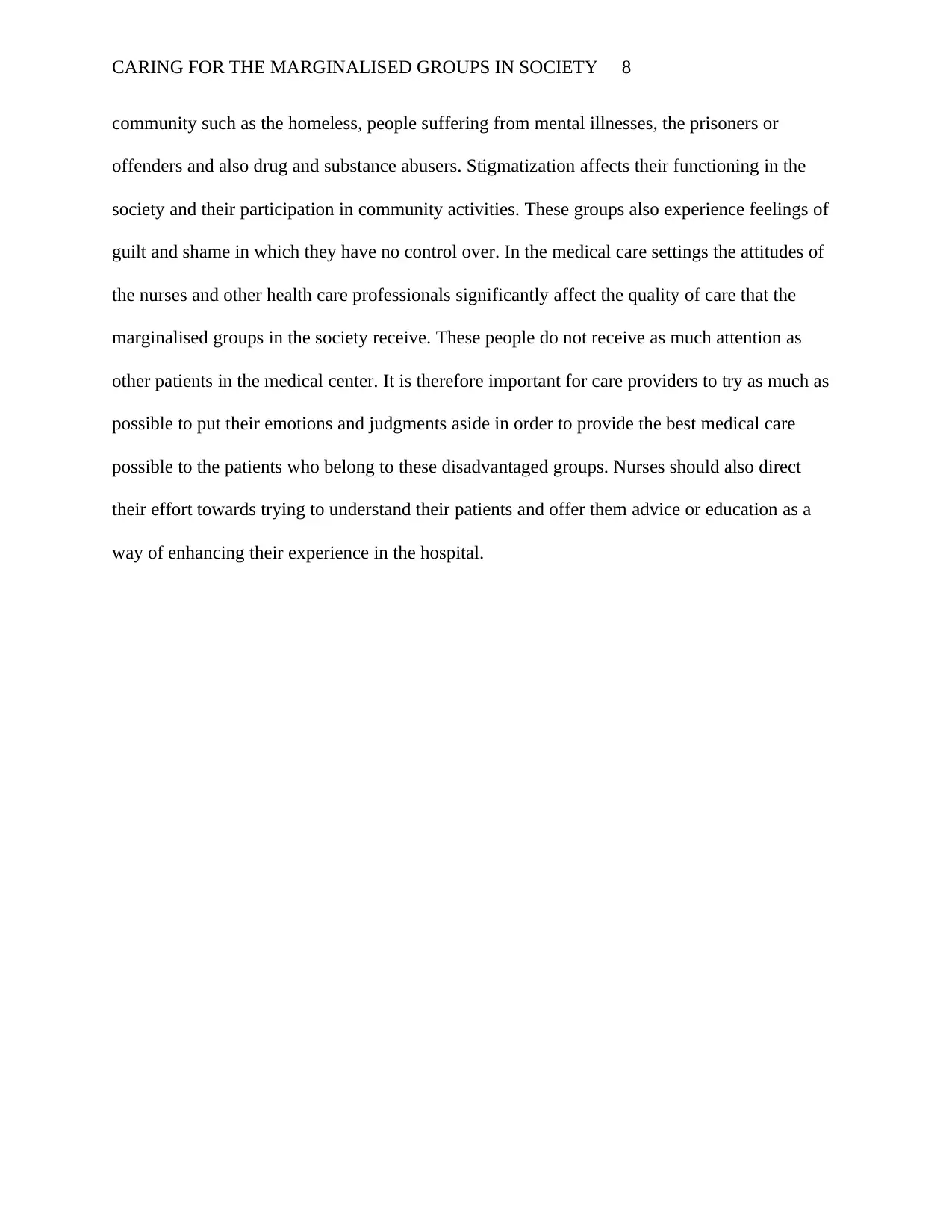
CARING FOR THE MARGINALISED GROUPS IN SOCIETY 8
community such as the homeless, people suffering from mental illnesses, the prisoners or
offenders and also drug and substance abusers. Stigmatization affects their functioning in the
society and their participation in community activities. These groups also experience feelings of
guilt and shame in which they have no control over. In the medical care settings the attitudes of
the nurses and other health care professionals significantly affect the quality of care that the
marginalised groups in the society receive. These people do not receive as much attention as
other patients in the medical center. It is therefore important for care providers to try as much as
possible to put their emotions and judgments aside in order to provide the best medical care
possible to the patients who belong to these disadvantaged groups. Nurses should also direct
their effort towards trying to understand their patients and offer them advice or education as a
way of enhancing their experience in the hospital.
community such as the homeless, people suffering from mental illnesses, the prisoners or
offenders and also drug and substance abusers. Stigmatization affects their functioning in the
society and their participation in community activities. These groups also experience feelings of
guilt and shame in which they have no control over. In the medical care settings the attitudes of
the nurses and other health care professionals significantly affect the quality of care that the
marginalised groups in the society receive. These people do not receive as much attention as
other patients in the medical center. It is therefore important for care providers to try as much as
possible to put their emotions and judgments aside in order to provide the best medical care
possible to the patients who belong to these disadvantaged groups. Nurses should also direct
their effort towards trying to understand their patients and offer them advice or education as a
way of enhancing their experience in the hospital.
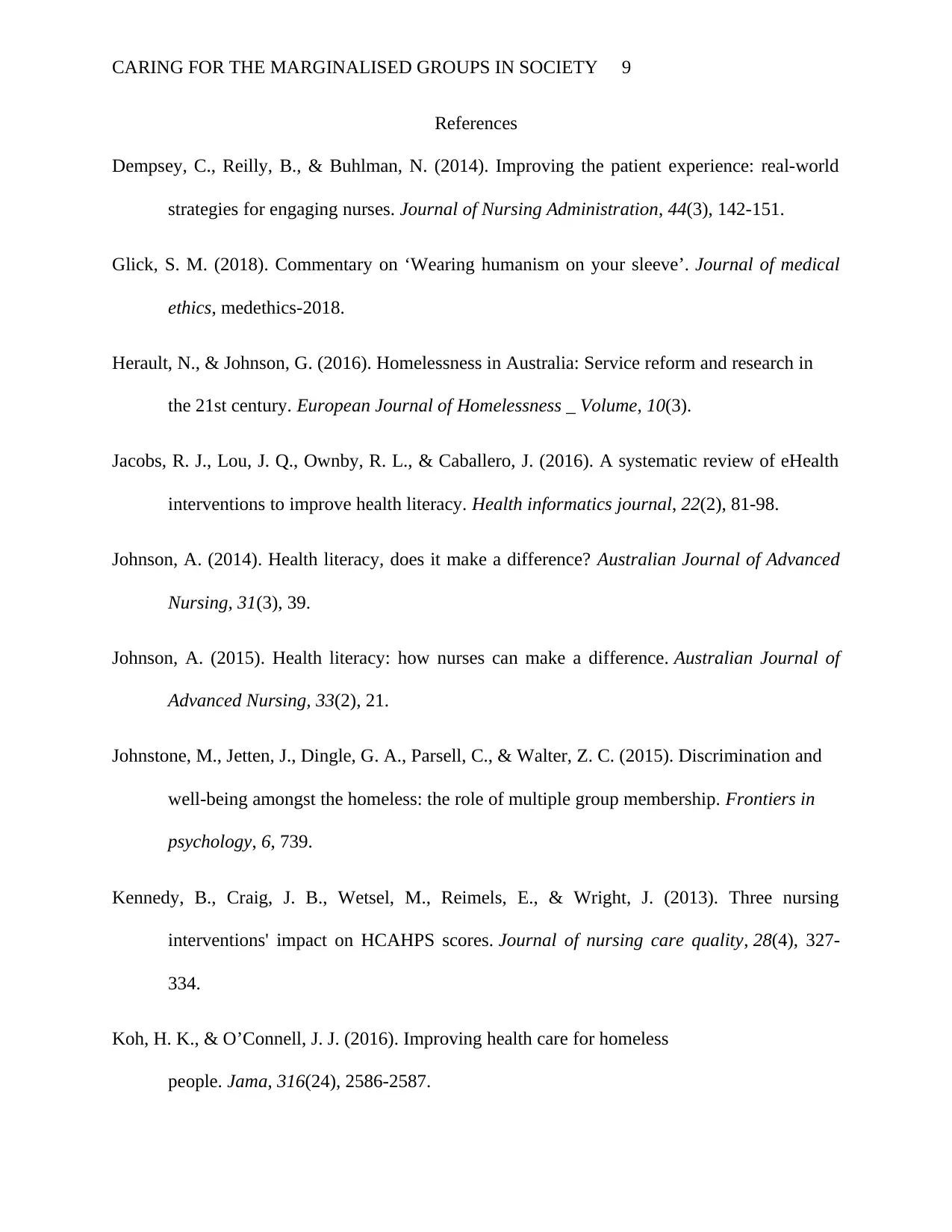
CARING FOR THE MARGINALISED GROUPS IN SOCIETY 9
References
Dempsey, C., Reilly, B., & Buhlman, N. (2014). Improving the patient experience: real-world
strategies for engaging nurses. Journal of Nursing Administration, 44(3), 142-151.
Glick, S. M. (2018). Commentary on ‘Wearing humanism on your sleeve’. Journal of medical
ethics, medethics-2018.
Herault, N., & Johnson, G. (2016). Homelessness in Australia: Service reform and research in
the 21st century. European Journal of Homelessness _ Volume, 10(3).
Jacobs, R. J., Lou, J. Q., Ownby, R. L., & Caballero, J. (2016). A systematic review of eHealth
interventions to improve health literacy. Health informatics journal, 22(2), 81-98.
Johnson, A. (2014). Health literacy, does it make a difference? Australian Journal of Advanced
Nursing, 31(3), 39.
Johnson, A. (2015). Health literacy: how nurses can make a difference. Australian Journal of
Advanced Nursing, 33(2), 21.
Johnstone, M., Jetten, J., Dingle, G. A., Parsell, C., & Walter, Z. C. (2015). Discrimination and
well-being amongst the homeless: the role of multiple group membership. Frontiers in
psychology, 6, 739.
Kennedy, B., Craig, J. B., Wetsel, M., Reimels, E., & Wright, J. (2013). Three nursing
interventions' impact on HCAHPS scores. Journal of nursing care quality, 28(4), 327-
334.
Koh, H. K., & O’Connell, J. J. (2016). Improving health care for homeless
people. Jama, 316(24), 2586-2587.
References
Dempsey, C., Reilly, B., & Buhlman, N. (2014). Improving the patient experience: real-world
strategies for engaging nurses. Journal of Nursing Administration, 44(3), 142-151.
Glick, S. M. (2018). Commentary on ‘Wearing humanism on your sleeve’. Journal of medical
ethics, medethics-2018.
Herault, N., & Johnson, G. (2016). Homelessness in Australia: Service reform and research in
the 21st century. European Journal of Homelessness _ Volume, 10(3).
Jacobs, R. J., Lou, J. Q., Ownby, R. L., & Caballero, J. (2016). A systematic review of eHealth
interventions to improve health literacy. Health informatics journal, 22(2), 81-98.
Johnson, A. (2014). Health literacy, does it make a difference? Australian Journal of Advanced
Nursing, 31(3), 39.
Johnson, A. (2015). Health literacy: how nurses can make a difference. Australian Journal of
Advanced Nursing, 33(2), 21.
Johnstone, M., Jetten, J., Dingle, G. A., Parsell, C., & Walter, Z. C. (2015). Discrimination and
well-being amongst the homeless: the role of multiple group membership. Frontiers in
psychology, 6, 739.
Kennedy, B., Craig, J. B., Wetsel, M., Reimels, E., & Wright, J. (2013). Three nursing
interventions' impact on HCAHPS scores. Journal of nursing care quality, 28(4), 327-
334.
Koh, H. K., & O’Connell, J. J. (2016). Improving health care for homeless
people. Jama, 316(24), 2586-2587.
⊘ This is a preview!⊘
Do you want full access?
Subscribe today to unlock all pages.

Trusted by 1+ million students worldwide
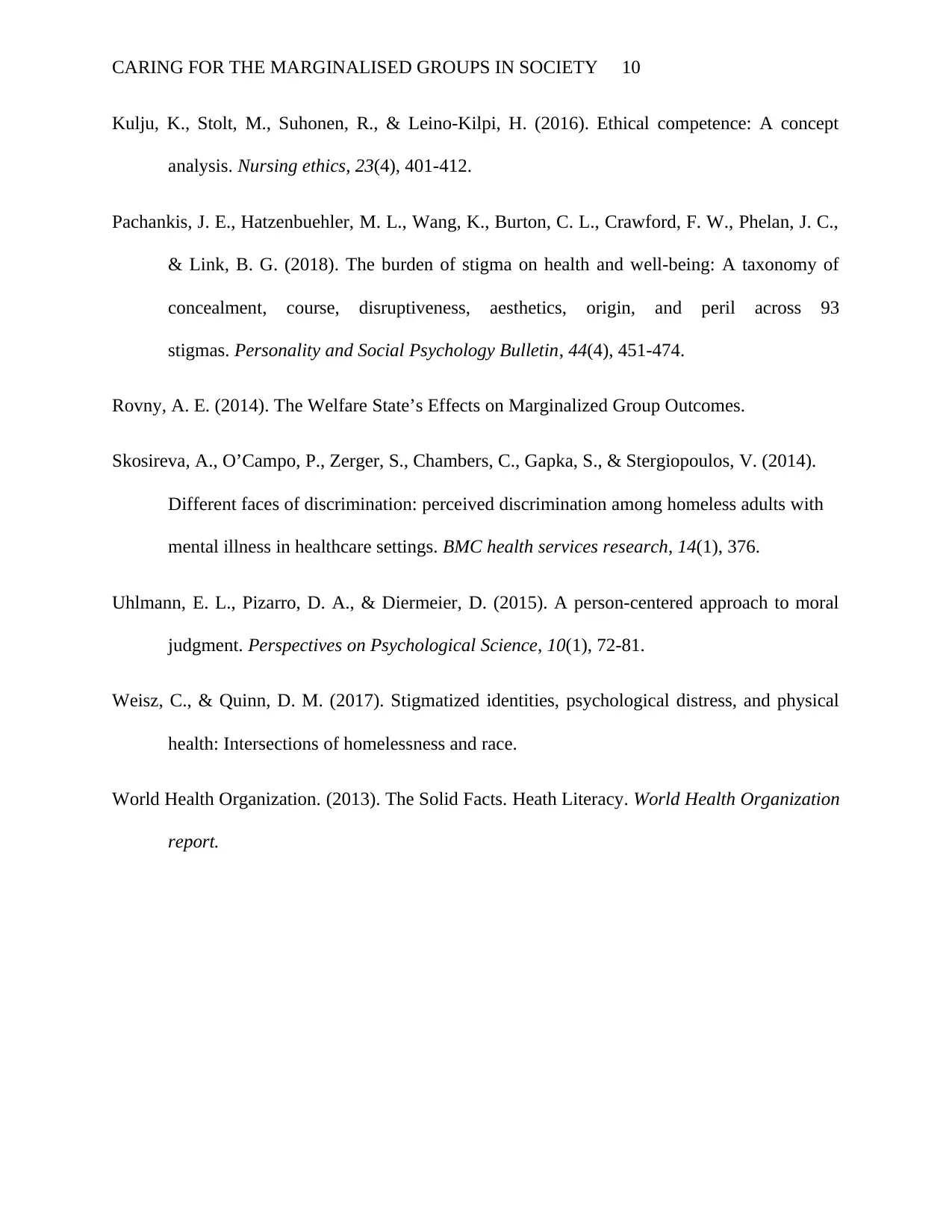
CARING FOR THE MARGINALISED GROUPS IN SOCIETY 10
Kulju, K., Stolt, M., Suhonen, R., & Leino-Kilpi, H. (2016). Ethical competence: A concept
analysis. Nursing ethics, 23(4), 401-412.
Pachankis, J. E., Hatzenbuehler, M. L., Wang, K., Burton, C. L., Crawford, F. W., Phelan, J. C.,
& Link, B. G. (2018). The burden of stigma on health and well-being: A taxonomy of
concealment, course, disruptiveness, aesthetics, origin, and peril across 93
stigmas. Personality and Social Psychology Bulletin, 44(4), 451-474.
Rovny, A. E. (2014). The Welfare State’s Effects on Marginalized Group Outcomes.
Skosireva, A., O’Campo, P., Zerger, S., Chambers, C., Gapka, S., & Stergiopoulos, V. (2014).
Different faces of discrimination: perceived discrimination among homeless adults with
mental illness in healthcare settings. BMC health services research, 14(1), 376.
Uhlmann, E. L., Pizarro, D. A., & Diermeier, D. (2015). A person-centered approach to moral
judgment. Perspectives on Psychological Science, 10(1), 72-81.
Weisz, C., & Quinn, D. M. (2017). Stigmatized identities, psychological distress, and physical
health: Intersections of homelessness and race.
World Health Organization. (2013). The Solid Facts. Heath Literacy. World Health Organization
report.
Kulju, K., Stolt, M., Suhonen, R., & Leino-Kilpi, H. (2016). Ethical competence: A concept
analysis. Nursing ethics, 23(4), 401-412.
Pachankis, J. E., Hatzenbuehler, M. L., Wang, K., Burton, C. L., Crawford, F. W., Phelan, J. C.,
& Link, B. G. (2018). The burden of stigma on health and well-being: A taxonomy of
concealment, course, disruptiveness, aesthetics, origin, and peril across 93
stigmas. Personality and Social Psychology Bulletin, 44(4), 451-474.
Rovny, A. E. (2014). The Welfare State’s Effects on Marginalized Group Outcomes.
Skosireva, A., O’Campo, P., Zerger, S., Chambers, C., Gapka, S., & Stergiopoulos, V. (2014).
Different faces of discrimination: perceived discrimination among homeless adults with
mental illness in healthcare settings. BMC health services research, 14(1), 376.
Uhlmann, E. L., Pizarro, D. A., & Diermeier, D. (2015). A person-centered approach to moral
judgment. Perspectives on Psychological Science, 10(1), 72-81.
Weisz, C., & Quinn, D. M. (2017). Stigmatized identities, psychological distress, and physical
health: Intersections of homelessness and race.
World Health Organization. (2013). The Solid Facts. Heath Literacy. World Health Organization
report.
Paraphrase This Document
Need a fresh take? Get an instant paraphrase of this document with our AI Paraphraser

CARING FOR THE MARGINALISED GROUPS IN SOCIETY 11
1 out of 11
Related Documents
Your All-in-One AI-Powered Toolkit for Academic Success.
+13062052269
info@desklib.com
Available 24*7 on WhatsApp / Email
![[object Object]](/_next/static/media/star-bottom.7253800d.svg)
Unlock your academic potential
Copyright © 2020–2026 A2Z Services. All Rights Reserved. Developed and managed by ZUCOL.





